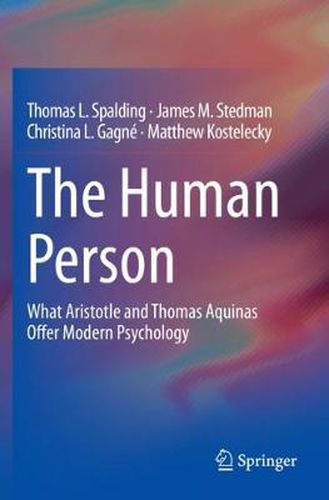Readings Newsletter
Become a Readings Member to make your shopping experience even easier.
Sign in or sign up for free!
You’re not far away from qualifying for FREE standard shipping within Australia
You’ve qualified for FREE standard shipping within Australia
The cart is loading…






This title is printed to order. This book may have been self-published. If so, we cannot guarantee the quality of the content. In the main most books will have gone through the editing process however some may not. We therefore suggest that you be aware of this before ordering this book. If in doubt check either the author or publisher’s details as we are unable to accept any returns unless they are faulty. Please contact us if you have any questions.
This book introduces the Aristotelian-Thomistic view of the human person to a contemporary audience, and reviews the ways in which this view could provide a philosophically sound foundation for modern psychology. The book presents the current state of psychology and offers critiques of the current philosophical foundations. In its presentation of the fundamental metaphysical commitments of the Aristotelian-Thomistic view, it places the human being within the broader understanding of the world.
Chapters discuss the Aristotelian-Thomistic view of human and non-human cognition as well as the relationship between cognition and emotion. In addition, the book discusses the Aristotelian-Thomistic conception of human growth and development, including how the virtue theory relates to current psychological approaches to normal human development, the development of character problems that lead to psychopathology, current conceptions of positive psychology, and the place of the individual in the social world. The book ends with a summary of how Aristotelian-Thomistic theory relates to science in general and psychology in particular.
The Human Person will be of interest to psychologists and cognitive scientists working within a number of subfields, including developmental psychology, social psychology, cognitive psychology, and clinical psychology, and to philosophers working on the philosophy of psychology, philosophy of mind, and the interaction between historical philosophy and contemporary science, as well as linguists and computer scientists interested in psychology of language and artificial intelligence.
$9.00 standard shipping within Australia
FREE standard shipping within Australia for orders over $100.00
Express & International shipping calculated at checkout
This title is printed to order. This book may have been self-published. If so, we cannot guarantee the quality of the content. In the main most books will have gone through the editing process however some may not. We therefore suggest that you be aware of this before ordering this book. If in doubt check either the author or publisher’s details as we are unable to accept any returns unless they are faulty. Please contact us if you have any questions.
This book introduces the Aristotelian-Thomistic view of the human person to a contemporary audience, and reviews the ways in which this view could provide a philosophically sound foundation for modern psychology. The book presents the current state of psychology and offers critiques of the current philosophical foundations. In its presentation of the fundamental metaphysical commitments of the Aristotelian-Thomistic view, it places the human being within the broader understanding of the world.
Chapters discuss the Aristotelian-Thomistic view of human and non-human cognition as well as the relationship between cognition and emotion. In addition, the book discusses the Aristotelian-Thomistic conception of human growth and development, including how the virtue theory relates to current psychological approaches to normal human development, the development of character problems that lead to psychopathology, current conceptions of positive psychology, and the place of the individual in the social world. The book ends with a summary of how Aristotelian-Thomistic theory relates to science in general and psychology in particular.
The Human Person will be of interest to psychologists and cognitive scientists working within a number of subfields, including developmental psychology, social psychology, cognitive psychology, and clinical psychology, and to philosophers working on the philosophy of psychology, philosophy of mind, and the interaction between historical philosophy and contemporary science, as well as linguists and computer scientists interested in psychology of language and artificial intelligence.